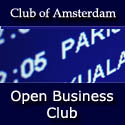The Web and Tourism: The Future of Online Travel: "Let's face it: more people travel now than ever before. That sounds trivial and obvious, but it has enormous impact on the sustainability of our planet, geopolitical issues, infrastructure and much more. But what has enabled this massive growth and what will it mean for the average person in the future? One enabling factor has been the huge change in travel distribution resulting from the internet and the worldwide web. We have moved from a closed, tightly controlled system of human travel agents to an almost limitless source of travel suppliers and options online, that anyone with a credit card can book themselves. Where will this take us in the world of Google, MySpace, Kayak and emerging technologies?." - Marc Bolick, Dmarc8 International.
Mark is a speaker at our next Season Event about
Felix Bopp, editor-in-chief
... still a few seats
available at the:
![]() LAB
on
MEDIA and
Human Experience
- May 29 & 30
LAB
on
MEDIA and
Human Experience
- May 29 & 30

| .UNWTO
calls for promoting sustainable tourism practices and .policies in Central and Eastern Europe |
||

|
The World Tourism Organization (UNWTO/OMT), a specialized agency of the United Nations, is a leading international organization in the field of tourism. It serves as a global forum for tourism policy issues and practical source of tourism know-how. |
|
International Tourism growth in Europe has exceeded expectations over the last three years, with the Baltic States outstanding as strong performers. UNWTO's long-term global forecast of 4% yearly growth until 2020 is likely to be matched or even exceeded in this region, assuming that GDP growth is maintained. Particularly Lithuania has experienced a considerable increase of both its share of arrivals and receipts within Central and Eastern Europe. This strong economic performance in Central and Eastern Europe goes hand in hand with the increasing recognition of ensuring sustainable growth in its environmental, social and economic dimensions, based on solid institutional and management structures. These issues were addressed during the International Seminar on Sustainable Development of Tourism in Central and Eastern Europe organized by UNWTO and hosted by Lithuania, from 28 February-1 March, 2007 in the capital in Vilnius. The event brought together more than 200 participants from 20 European countries, ranging from tourism policy makers, managers at national, regional and destination levels, private sector and academia representatives. Relevance for policy-makers The principles of sustainable development, as often expressed through Sustainable Development Strategies, have been embraced by most countries and are finding their way into national policies. UNWTO considers the need for policy-makers to regard the Travel & Tourism sector as a social activity which cross-relates to vital sectors of the economy, with important implications and effects on areas such as employment, transport or infrastructure. Therefore the general sustainability approach should also be streamlined into tourism policies, bearing in mind the steady growth of tourism in the coming years. This favourable inbound and revenue perspective should foster the initiative to further develop the natural and cultural resources of Central and Eastern Europe. These assets represent a basis for sustainable tourism. The challenge for policy-makers lies in managing the increasing development pressure in the area, which might pose a threat to natural and cultural resources. Key conclusions The achievement of sustainability - as a balance between environmental, economic and social aspects - has to build on a set of institutional and management structures. Therefore creating a solid institutional framework, which in itself is a long-term process, is a necessary condition to reach sustainability objectives. Among the specific challenges underscored, the Seminar paid particular attention to:
The key conclusions of this UNWTO Seminar are varied and comprise general and specific aspects, among which the following stood out:
The way forward All these key conclusions and aspects lead to the challenges facing the development of sustainable tourism. The Seminar concluded that there is a need not to repeat past mistakes from developments in other parts of Europe, where the short-term perspectives of increasing revenues prevented sound planning and protection, hence making a sustainable approach much more difficult or even less likely. In this regard, the European Union's Tourism Sustainability Group, also supported by UNWTO, has set out a policy and action framework in order to make tourism more sustainable in Europe. The experts gathered at the UNWTO Seminar agreed for the clear need to create sustainable tourism strategies, which have to involve all stakeholders in the process, both at a national and local level. Furthermore, strategies at different levels must relate to each other and be mutually consistent. UNWTO considers that there is considerable room for improvement and a real chance to build principles of sustainability into the design and implementation of tourism policies. |
||
| .Media LAB | ||
|
|
||
| .News about the future of Tourism | ||
 |
|
|
 |
|
|
| .Club of Amsterdam blog | ||
 |
April
20: |
|
| .News about the Future | ||
 |
|
|
 |
Technology that scans and reads printed material to the blind is nothing new, but this personal reader is the first handheld device to do the job. Combining a state-of-the-art digital camera with a personal data assistant, the Kurzweil–National Federation of the Blind Reader puts the best available character recognition software together with text-to-speech conversion technology, all in the palm of your hand. Hold the Reader’s
camera over print - a restaurant menu, directions, or a memo from
your boss - and snap a picture. In seconds you can hear the contents
of the printed document in clear synthetic speech. Scan, read, and
discard pages; store them for later reading; or transfer to a computer
or Braille-aware PDA. The Reader even has a headphone jack so you
won’t disturb your neighbors. |
|
| .Sustainable Energy: A Framework for Decision Makers | ||
|
“The economic, environmental and social impacts of bioenergy development must be assessed carefully before deciding if and how rapidly to develop the industry and what technologies, policies and investment strategies to pursue,” the report warned. The document, Purpose of the study was to help ensure that “the energy needs of people are met and the local and global environment is adequately protected,” said UN-Energy Chair Mats Karlsson of the World Bank. “We hope to use the collective strength of the UN system to affect change”. Key issues In an apparent reference to the use of some grains as a biofuel feedstock, UN-Energy noted, “In general, crops that require high fossil energy inputs (such as conventional fertilizer) and valuable (farm) land, and that have relatively low energy yields per hectare, should be avoided.” Sustainable bioenergy
use To minimize greenhouse gas emissions associated with bioenergy production, policy makers needed to safeguard virgin grasslands, primary forests and other lands with high nature value, UN-Energy recommended. Governments should also encourage the use of sustainable bioenergy production and management practices. An international certification scheme, including greenhouse gas verification, should be set up to ensure that bioenergy products, and biofuels in particular, meet environmental standards all the way from fields to fuel tanks. On food security, the report said that the availability of adequate food supplies could be threatened by biofuel production as land, water and other resources were diverted from food production. Similarly, food access could be compromised by higher basic food prices resulting from increased bioenergy feedstock demand, thus driving the poor and food insecure into even greater poverty. Growing opportunity Modern bioenergy can also help to meet the needs of the 1.6 billion people worldwide who lack access to electricity in their homes, and the 2.4 billion who rely on straw, dung and other traditional biomass fuels to meet their energy requirements. Overall, in taking decisions, policy makers “should ensure that food security considerations are given priority,” the report stressed. Bringing down trade
barriers Impeding imports of more efficiently produced biofuels from abroad while simultaneously mandating the blending of biofuel with fossil fuels at home could divert more land than necessary from food production, it said. Involving farmers Mixed production “Regardless of the scale of production, however, one thing is clear: the more involved farmers are in the production, processing and use of biofuels, the more likely they are to share in the benefits.” Kitchen killer |
||
| .Next Season Event | ||

|
Thursday, May 31 , 2007 Registration: 18:30-19:00, Conference: 19:00-21:15 Where: Info.nl, Sint Antoniesbreestraat 16, 1011 HB Amsterdam [Next to Nieuwmarkt] With Joachim Willms, Managing Director, Tourism Futures Institute The Future Trends in Tourism: Global Perspectives Wybren Meijer, Futureconsult Main Drivers in the Future of Tourism Martin Nydegger, Director, Switzerland Tourism, The Netherlands Switzerland's reaction to the climate change challenge Marc Bolick, Dmarc8 International The Web and Tourism: The Future of Online Travel Moderated by Joep Dirven, Partner & Consultant, X-markt Moderator |
|
| .Recommended Book | ||
 |
by Shardul Agrawala This report presents the first systematic cross-country analysis of the effects of climate change on snow-reliability in the European Alps. Following some of the warmest years on record in the last 500 years, climate model projections show even greater changes in the region in coming decades. Less snow at low altitudes and receding glaciers and melting permafrost higher up will have a significant impact on snow tourism activities, and on the management of natural hazards. The implications of the assessment extend beyond the European Alps to other mountain systems which may face similar climate and contextual challenges, for example in North America, Australia and New Zealand. |
|
| .Scientists discover new life in the Antarctic deep sea | ||
|
Scientists have found hundreds of new marine creatures in the vast, dark deep-sea surrounding Antarctica. Carnivorous sponges, free-swimming worms, crustaceans, and molluscs living in the Weddell Sea provide new insights into the evolution of ocean life. Reporting this week in the journal Nature, scientists describe how creatures in the deeper parts of the Southern Ocean - the source for much of the deep water in the world ocean – are likely to be related to animals living in both the adjacent shallower waters and in other parts of the deep ocean. A key question for scientists is whether shallow water species colonised the deep ocean or vice versa. The research findings suggest the glacial cycle of advance and retreat of ice led to an intermingling of species that originated in shallow and deep water habitats. Lead author Professor Angelika Brandt from the Zoological Institute and Zoological Museum, University Hamburg says, “The Antarctic deep sea is potentially the cradle of life of the global marine species. Our research results challenge suggestions that the deep sea diversity in the Southern Ocean is poor. We now have a better understanding in the evolution of the marine species and how they can adapt to changes in climate and environments.” Dr Katrin Linse, marine biologist from British Antarctic Survey, says, “What was once thought to be a featureless abyss is in fact a dynamic, variable and biologically rich environment. Finding this extraordinary treasure trove of marine life is our first step to understanding the complex relationships between the deep ocean and distribution of marine life.” Three research expeditions,
as part of the ANDEEP project (Antarctic benthic deep-sea biodiversity),
onboard the German research ship Polarstern took place between
2002 and 2005. An international team from 14 research organisations
investigated the seafloor landscape, its continental slope rise
and changing water depths to build a picture of this little known
region of the ocean. They found over 700 new species. |
||
|
||
| .The world’s smallest published book | ||
|
The only catch - you’ll need a scanning electron microscope to read it. At 0.07 mm X 0.10 mm, Teeny Ted from Turnip Town is a tinier read than the two smallest books currently cited by the Guinness Book of World Records: the New Testament of the King James Bible (5 X 5 mm, produced by MIT in 2001) and Chekhov’s Chameleon (0.9 X 0.9 mm, Palkovic, 2002). By way of comparison, the head of a pin is about 2 mm. The production of the nanoscale book was carried out at SFU by publisher Robert Chaplin, with the help of SFU scientists Li Yang and Karen Kavanagh. The work involved using a focused-gallium-ion beam and one of a number of electron microscopes available in SFU’s nano imaging facility. With a minimum diameter of seven nanometers (a nanometer is about 10 atoms in size) the beam was programmed to carve the space surrounding each letter of the book. The book is made up of 30 microtablets, each carved on a polished piece of single crystalline silicon, and has its own International Standard Book Number, ISBN-978-1-894897-17-4. The story, written by Chaplin’s brother Malcolm Douglas Chaplin, is a fable about Teeny Ted’s victory in the turnip contest at the annual county fair. Considered an intricate work of contemporary art, the book is available in a signature edition (100 copies) from the publisher, through the SFU lab. |
||
| .Agenda | ||
|
||
|
||
|
||
| .Club of Amsterdam Open Business Club | ||

|
Are you interested in networking, sharing visions, ideas about your future, the future of your industry, society, discussing issues, which are relevant for yourself as well as for the 'global' community? The future starts now - join our online platform ...: http://www.openbc.com/go/invuid/Felix_Bopp2 CIWI - Creative Minds Worldwide |
|
| .Contact | ||
|
||
| .Subscribe & Unsubscribe | ||
|
||
| m | ||
Copyright © 2002-2007, Club of Amsterdam. All rights reserved.



















